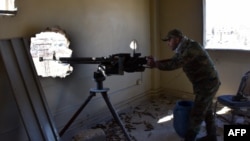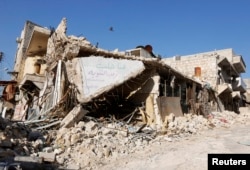After days of heavy combat, Syria said Saturday that its Russia-backed army had gained "full control" of a key rebel-held district in the war-torn city of Aleppo.
State media reported army engineering units in the Masaken Hanano district were dismantling mines and other explosive devices planted by rebels who had seized control of eastern Aleppo in 2012 as part of a push to topple the government of President Bashar al-Assad.
"The armed forces retook full control of Masaken Hanano after having put an end to the presence of terrorists there," state television reported.
Western analysts have for days stressed the strategic significance of Masaken Hanano, the largest district in eastern Aleppo, warning that its fall would place government forces in position to cut off northern parts of the rebel-held sector from the rest of the opposition-held districts.
The Syrian Observatory for Human Rights, which monitors and reports on the country's nearly six-year civil war, said last week that the imminent fall of Masaken Hanano would give the government regime a line-of-fire control over several other neighborhoods.
Ground assault
Government ground forces began a push into Masaken Hanano last week, after days of an intensive bombing campaign by Syrian and Russian warplanes.
Samantha Power, the U.S. ambassador to the United Nations, told the U.N. Security Council recently that nearly 300 civilians had been killed in eastern Aleppo in the preceding week. Dozens more have been reported killed since then.
"The reality is that the [government] regime and Russia are continuing their 'starve, get bombed or surrender' strategy in eastern Aleppo," she said Monday.
Moscow and Damascus have routinely described the fight against rebels in eastern Aleppo as a battle against terrorists, despite the sector's vast civilian population trapped in the city since fighting resumed in September. Both governments have used that characterization to justify the deadly and apparently indiscriminate bombings in the sector since then.
Western governments and the United Nations have framed the Aleppo onslaught as a vast humanitarian crisis that threatens the safety of at least 250,000 civilians believed trapped in the mayhem. Diplomats and human rights organizations argue that both Moscow and Damascus could face war crimes inquiries for their roles in the destruction of eastern Aleppo.






